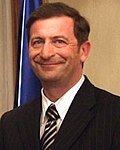Cerar cabinet | |
|---|---|
| 12th Cabinet of Slovenia | |
 | |
| Date formed | 18 September 2014 |
| Date dissolved | 13 September 2018 |
| People and organisations | |
| Head of state | Borut Pahor |
| Head of government | Prime Minister Miro Cerar (SMC) |
| Member party | |
| Status in legislature | Majority (coalition) |
| Opposition party | |
| Opposition leader | |
| History | |
| Election | 2014 election |
| Predecessor | Bratušek cabinet |
| Successor | Šarec cabinet |
The 12th Government of Slovenia, led by Prime Minister Miro Cerar, was announced on 18 September 2014. It was formed following the 2014 parliamentary election won by the centre-left Party of Miro Cerar; it was the third government formed over four years. At 51 years, Cerar was the second oldest Prime Minister of Slovenia since Independence, following Andrej Bajuk at 56 years. The cabinet had on the day of inauguration the highest number of women ministers representatives, as there were seven women ministers out of sixteen ministers in total. Cerar's cabinet was the highest educated cabinet to date, with six members with a doctorate.
After the resignation of Alenka Bratušek's cabinet, President Borut Pahor determined that the new elections would take place on 13 July 2014. With 34.49% Cerar won by the highest percentage on any parliamentary elections since Independence. It was decided not to cooperate with the Slovenian Democratic Party (SDS), as its leader Janez Janša was sentenced to two years imprisonment. [1] On 28 July 2014 Cerar sent an outline of the coalition agreement to all other parties that attended the coalition talks. The first to agree was the president of Democratic Party of Pensioners of Slovenia (DeSUS) Karel Erjavec, with whom Cerar gathered the necessary 45+ seats in Parliament. The next and last to join the coalition was Dejan Židan with his Social Democrats (SD) party. [2] The coalition agreement was signed on 3 September 2014.
Cabinet members came from three parties of the new coalition:
- Party of Miro Cerar (SMC): 8 ministers and 1 minister without portfolio
- Democratic Party of Pensioners of Slovenia (DeSUS): 3 ministers and 1 minister without portfolio
- Social Democrats (SD): 3 ministers
- Independent (Ind): 1 minister
On the 14 March 2018, following the verdict of the Supreme Court of Slovenia to annul the referendum on the so-called "Second Railway track", Miro Cerar announced his resignation as Prime Minister.






















